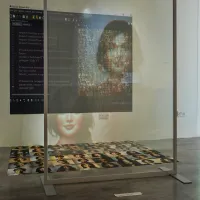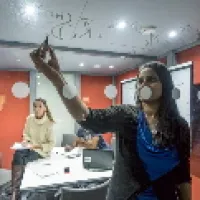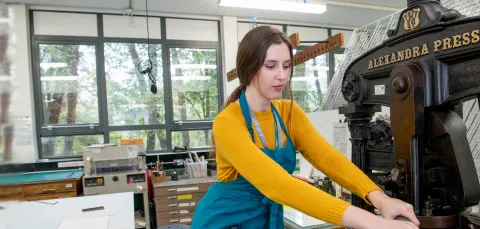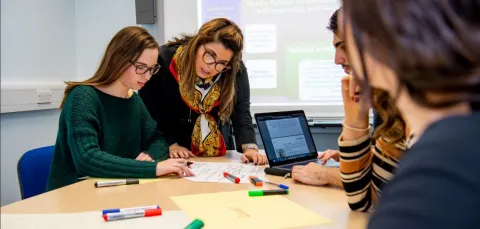About this course
Gain the knowledge and skills to be a fully qualified teacher of design and technology on this PGCE Secondary course at the University of Southampton. You’ll divide your time between school placements and the University as you develop the theory and techniques to teach the subject to all secondary school pupils. With this qualification you'll be able to work in academy, state-maintained, independent and special schools in England and Wales.
This Postgraduate Certificate in Education (PGCE) course will prepare you to teach young people aged 11 to 16 within the UK’s National Curriculum for Design Technology framework (Key Stages 3 and 4).
You’ll also get the chance to learn about teaching the subject to students aged 16 to 19.
As you build on your existing knowledge of design and technology, you’ll also:
- develop a strong grasp of the most effective teaching strategies
- train to work within a range of different schools
- critically assess teaching styles and resources to develop your own methodology
Through university sessions and placement practice you’ll also learn essential skills such as:
- managing the classroom
- monitoring and assessing pupils
- teaching inclusively
You'll put theory into practice through placements at 2 schools in or near Southampton. You'll spend at least 120 days on placement, observing lessons and working with small groups of young people. When you are ready, you’ll then be introduced to whole-class teaching. You’ll have the support of a school-based mentor throughout this time.
The rest of your time will be spent at the University, where we'll prepare you for your placements, evaluate your school-based work, and develop subject-specific skills and good practice.
Talk to a tutor
Looking for more information? Send your question to one of our PGCE tutors.
We regularly review our courses to ensure and improve quality. This course may be revised as a result of this. Any revision will be balanced against the requirement that the student should receive the educational service expected. Find out why, when, and how we might make changes.
Our courses are regulated in England by the Office for Students (OfS).
Course lead
Your course leader is Susan Fishlock, a Senior Teaching Fellow in the Southampton Education School. She has a background teaching Art and Design in secondary schools, most recently in a school within the city. Read Susan's staff profile to find out more about her work.
Learn more about these subject areas
Course location
This course is based at Highfield.
Awarding body
This qualification is awarded by the University of Southampton.
Download the Course Description Document
The Course Description Document details your course overview, your course structure and how your course is taught and assessed.
Entry requirements
You’ll need:
- a 2:2 degree (UK honours degree or equivalent) in a design or technology related subject
- strong subject knowledge
- GCSEs (minimum grade 4/C) in English language and maths
If you don't have the required GCSEs we'll ask you at the offer stage to take equivalency tests. You'll need to cover the cost of the tests yourself.
Find the equivalent international qualifications for your country.
Secondary school classroom experience may strengthen your application.
Before applying, you should read the UK National Curriculum for Design Technology and the standards for the award of Qualified Teacher Status.
We do not accept IELTS in lieu of the English Language GCSE requirement.
English language requirements
If English isn't your first language, you'll need to complete an International English Language Testing System (IELTS) to demonstrate your competence in English. You'll need all of the following scores as a minimum:
IELTS score requirements
- overall score
- 7.0
- reading
- 6.5
- writing
- 6.5
- speaking
- 6.5
- listening
- 6.5
We accept other English language tests. Find out which English language tests we accept.
If you don’t meet the English language requirements, you can achieve the level you need by completing a pre-sessional English programme before you start your course.
Pre-masters
If you don’t meet the academic requirements, you can complete a pre-master's programme through our partnership with OnCampus. Learn more about the programmes available.
Got a question?
Please contact us if you're not sure you have the right experience or qualifications to get onto this course.
Email: enquiries@southampton.ac.uk
Tel: +44(0)23 8059 5000
Course structure
This is a full-time course. You’ll study from September to June, with breaks at Christmas and Easter.
You’ll divide your time between the University and 2 placement schools.
Typically, the number of days is:
- 120 days training and teaching experience in 2 placement schools
- 20 days intensive training split between the university and key partnership schools
- 20+ days subject-specific training at university
- Additional professional studies training and enrichment opportunities at university
Your main placement will start in late September. Your experienced school-based mentor will provide individual support to help you with your progression. By the end of the course in July, you’ll be able to confidently manage an early-career teacher’s timetable. You’ll also train and teach in a contrasting school for long enough to understand the differences between the schools.
We work closely with schools in Southampton and also have strong partnerships with schools throughout Hampshire, Wiltshire, Dorset and the Isle of Wight. For trainee teachers based in the Salisbury area we have a long history of working with Salisbury schools to secure excellent placements. Placements take account of where you are living and your transport options, as well as your identified training needs.
The course consists of 4 compulsory modules. These are assessed at Masters-level and lead to the award of the PGCE.
Want more detail? See all the modules in the course.
Modules
The modules outlined provide examples of what you can expect to learn on this degree course based on recent academic teaching. As a research-led University, we undertake a continuous review of our course to ensure quality enhancement and to manage our resources. The precise modules available to you in future years may vary depending on staff availability and research interests, new topics of study, timetabling and student demand. Find out why, when and how we might make changes.
For entry in academic year 2025 to 2026
Year 1 modules
You must study the following modules :
Assignment A: Perspectives on Behaviour Management
The outcomes of the module are for the student to make an oral presentation on their investigations into how to manage behaviour for positive classroom learning. This assignment will be introduced following a university and school-based block of Intens...
Assignment B: Subject Pedagogy
The outcomes of the module are for students to submit an essay that includes two elements: a) a literature review of the topic b) a detailed Lesson Plan with commentary This will be a subject-specific module and through lesson plan commentary the st...
Assignment C: Practitioner Inquiry Project
The outcomes of this module are for students to engage in a small-scale practitioner inquiry project within their subject-disciple. There will be two elements: a) An inquiry plan which will outline how the student will place the chosen aspect under scrut...
Assignment D: Becoming a Teacher
This module consists of a Professional Portfolio of Evidence from Teaching across all Placement Schools/Colleges. It is assessed against the Teachers’ Standards and is used to evidence that QTS (Qualified Teacher Status) has been met by the Trainee Teache...
Learning and assessment
Learning
In your school placements, you’ll have structured opportunities to observe experienced teachers at work and to discuss professional issues with colleagues. You’ll spend the majority of time learning from practical experience in the classroom.
At university, the learning activities include:
- workshops and seminars
- tutorials
- group activities
- directed study
- independent study and research
- conference days
- guest speakers
Assessment
Assessment is based mainly on your ability to teach. You’ll also have 3 major assignments and several short tasks, which you’ll receive preparation for.
We’ll also assess you using:
- written assignments
- a presentation
- a portfolio
Academic Support
We’ll assign you a personal tutor, and you’ll have access to a senior tutor.
Careers and employability
The employability and enterprise skills you'll gain from this course are reflected in the Southampton skills model. When you join us you'll be able to use our skills model to track, plan, and benefit your career development and progress.
Download skills overview

Work experience opportunities
Choosing to do work experience is a great way to enhance your employability, build valuable networks, and evidence your potential. Learn about the different work and industry experience options at Southampton.
Careers services and support
We are a top 20 UK university for employability (QS Graduate Employability Rankings 2022). Our Careers, Employability and Student Enterprise team will support you. This support includes:
- work experience schemes
- CV and interview skills and workshops
- networking events
- careers fairs attended by top employers
- a wealth of volunteering opportunities
- study abroad and summer school opportunities
We have a vibrant entrepreneurship culture and our dedicated start-up supporter, Futureworlds, is open to every student.
Your career ideas and graduate job opportunities may change while you're at university. So it is important to take time to regularly reflect on your goals, speak to people in industry and seek advice and up-to-date information from Careers, Employability and Student Enterprise professionals at the University.
Fees, costs and funding
Tuition fees
Fees for a year's study:
- UK students pay £9,250.
- EU and international students pay £25,400.
What your fees pay for
Your tuition fee covers the full cost of tuition and any exams. The fee you pay will remain the same each year from when you start studying this course. This includes if you suspend and return.
Find out how to pay your tuition fees.
Accommodation and living costs, such as travel and food, are not included in your tuition fees. There may also be extra costs for retake and professional exams.
Explore:
10% alumni discount
If you’re a graduate of the University of Southampton, you could be eligible for a 10% discount on your postgraduate tuition fees.
Funding, bursaries and scholarships for teacher training
There is a variety of government funding available for teacher training, including bursaries, scholarships and other financial support.
Find out more and check your eligibility on the Department for Education website.
Other postgraduate funding options
A variety of additional funding options may be available to help you pay for your master’s study. Both from the University and other organisations.
Funding for EU and international students
Find out about funding you could get as an international student.
How to apply
You must apply for this course on GOV.UK. You’ll need to create an account in order to submit your application.
Application deadlines
The deadline to apply for this course is early July 2025.
We advise applying early as applications may close before the deadline if places are filled. We allocate places on a continuous basis from October 2024 until the course is full.
Visit GOV.UK for the latest information on PGCE course availability.
Supporting information
GOV.UK processes applications for this course. When you apply, they’ll give you details of any supporting information or documents you’ll need to supply.
Academic and employment history
We require all applicants to provide a full breakdown of their previous employment and academic study, including career breaks, from age 16 (GCSE) up to the point of their DFE application.
Original documents
You'll need to provide copies of your original academic qualifications, for example GCSE, A Level and degree, during the application process.
If you join the course, you will also need to provide your original documents in person during induction. Please allow enough time to order replacement certificates if you no longer have your originals.
We will only accept certificates or a final official Statement of Results from the awarding body. We do not accept Candidate Statement of Provisional results and we are also unable to accept letters from educational establishments/schools or colleges as confirmation of results. For evidence of undergraduate education, we will accept a certificate and/or official transcript.
What happens after you apply
After applying through GOV.UK you’ll hear from us by email. We have 40 days to respond, but most applicants hear back much sooner.
If you get through to the next stage we’ll invite you to an interview with tutors, where we’ll assess your suitability for training and teaching. We’ll also ask you to give a short presentation and carry out a written task.
We’ll then decide whether to offer you a conditional place. The decision will be uploaded to your GOV.UK application within 5 working days.
All offers are conditional on enhanced Disclosure and Barring Service (DBS) and health checks. You will need to pay for these checks.
If you have spent time outside of the UK, you will also need to obtain criminal record checks from the countries you have lived in.
Equality and diversity
We treat and select everyone in line with our Equality and Diversity Statement.
Got a question?
Please contact us if you're not sure you have the right experience or qualifications to get onto this course.
Email: enquiries@southampton.ac.uk
Tel: +44(0)23 8059 5000
Related courses

Arts and Cultural Leadership

Communication Design

Contemporary Curating

Creative Technologies

Design Management

Digital Media Practices

Education

Education (Online)

Education Management and Leadership

Education Practice and Innovation

Fashion Design

Fashion Management

Fashion Marketing and Branding

Fine Art

Global Advertising and Branding

Global Media Management

Luxury Brand Management

PGCE Art and Design

PGCE English

PGCE Geography

PGCE History

PGCE Mathematics

PGCE Modern Languages

PGCE Physical Education

PGCE Primary

PGCE Sciences

PGCE Secondary

Textile Design




